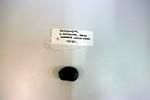Kombañiŋ teplakay ‘Painting faces with Annato tree pigment’
- Description:
- The bright orange-red coloured oily seeds of kombañiŋ ‘annatto tree’ (Bixa orellana) are so frequently used in face painting and body decoration that, for the Awiakay, they are nearly synonymous with ritual, traditional songs and dancing. The seeds are also used as a pigment for colouring the string for making bilums. Painting faces with kombañiŋ is associated with the excitement and the joyous atmosphere in the village when everyone is preparing for a night of singing and dancing. It is the time of benevolent relations in the village, as dancing never occurs during disputes or when two groups have heavy feelings about each other. Making this string figure involves two players, and requires two long strings. Both players make the moves simultaneously. When the final design emerges, the players go in to ‘paint their faces with annatto pigment’. In the second part of the recording the two players were asked to describe their moves. We can hear them hesitating when doing so, as this is not how they normally talk about string figures. The Awiakay terms are thus used with some improvisation. Images: 02: The fruits of Annato tree (Bixa orellana) contain the oily seeds which are used as pigment 03: Charles Moyambe painting his face with annato tree pigment (2009) . Language as given: Awiakay. You can access this item at the PARADISEC website. You will need to sign up or sign in first.
- Format:
- MovingImage
- Collections:
- PARADISEC Catalog
- Contributors:
- Darja Hoenigman
- Content partner:
- PARADISEC
- Availability:
- Not specified
-
Copyright status: All rights reservedFind out more about what you are able to do with this itemThis item is all rights reserved, with means you'll have to get permission from PARADISEC before using it. For more information, please see our use and reuse page.More informationPARADISEC has this to say about the rights status of this item:
Open (subject to agreeing to PDSC access conditions)
What can I do with this item?Non-infringing useNZ copyright law does not prevent every use of a copyright work, and this item may be hosted by an international institute or organisation. You should consider what you can and cannot do with a copyright work.No sharingYou may not copy and/or share this item with others without further permission. This includes posting it on your blog, using it in a presentation, or any other public use.No modifyingYou are not allowed to adapt or remix this item into any other works.No commercial useYou may not use this item commercially.
Related items
Welcome and warm Pasifik greetings
The information on this site has been gathered from our content partners.
The names, terms, and labels that we present on the site may contain images or voices of deceased persons and may also reflect the bias, norms, and perspective of the period of time in which they were created. We accept that these may not be appropriate today.
If you have any concerns or questions about an item, please contact us.
